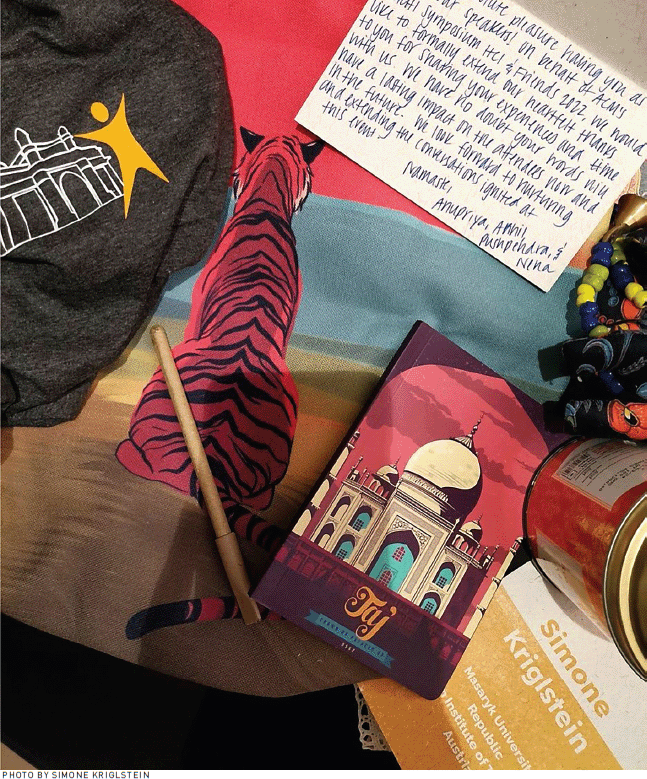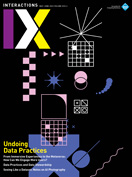Authors:
The SIGCHI-sponsored HCI and Friends Symposium that took place December 9–11, 2022, at the Indian Institute of Technology Bombay campus in Mumbai, India, was the outcome of a few different plans that had been in the making over the past three to four years [1]. When "Expanding the Horizons of Human-Centered AI (HCAI)," the 2019 ACM SIGCHI–supported summer school, turned out to be a great success, plans were made to bring the event back the following year [2]. Akhil Mathur and Pushpendra Singh also secured support from the SIGCHI Development Fund to organize the event. But 2020 had other plans for us and the world. In 2022, we decided to give an on-site event another shot, organizing it alongside the SIGCHI Executive Committee (EC) meeting and taking up Anirudha Joshi's offer to host the EC in Mumbai, for an event that would bring together those doing HCI and HCI-adjacent work in India and beyond.
The three-day event brought forth many enriching conversations—on design and development, health and sustainability, games and languages, and much more. There were 29 speakers, who led attendees through 10 sessions [1]. The event had more than 150 participants, including many students and early-career researchers in the process of deciding whether or not HCI was for them. Each day featured three 90- to 120-minute sessions, and each session was divided into two parts. Three or four speakers each gave 20-minute talks, followed by a 30-minute panel where all speakers for the session discussed one another's talks and answered audience questions. The event was predominantly on-site, but several speakers joined remotely, and sessions were available on Zoom.
A running theme throughout the conference was a reflective and critical stance on what technology can accomplish in light of social realities, and how we might leverage it effectively toward social change. Bill Thies reflected on his time at Microsoft Research and what he had learned from designing and deploying technology at scale. Armman's Neha Madhiwalla presented her perspective from years of work on maternal and child health, pushing us to question the harms that technology can cause. Madeline Balaam ended her talk on interaction design for intimate health and well-being with a crucial reminder from Kevin Kumashiro that "we are not trying to move to a better place; rather, we are just trying to move" [3]. Jay Chen emphasized the importance of acting with urgency, in our varied capacities, to consume less. These are just a few examples of the many rich conversations we had on the future(s) that lie(s) ahead of us. It was clear that there is much to be learned from these interstices of HCI, the spaces where stakeholders come together, however briefly, and thoughts intersect.
The poster session, held on day two, offered an excellent space for research conversations to unfold, and three poster judges (thank you, Luigi De Russis, Dipanjan Chakraborty, and Dilisha Patel) discussed the work with the participants in great detail. The prizes went to the following participants, in this order:
- Sukhnidh Kaur (Microsoft Research, India) for her work on "Experiences of Indian Journalists on Twitter in India"
- Gauri Bhatnagar (IIIT-Delhi) for her work on "Unpacking Tensions in Designing an Annotation System for Public Toilets to Support Menstrual Mobilities"
- Pranjal Jain (Swansea University, United Kingdom) for his work on "Worker Centric Supertools Driven by Tacit Knowledge."
Much care went into the organization of the event (mainly thanks to Anupriya Tuli, though we all did our best to support her vision). When organizing any event of this size or larger, there are many choices, both big and small, to be made. Sustainability remained an intentional focus, and even as we covered travel costs for several participants, we also made efforts to minimize waste at the conference. We did not distribute plastic water bottles, and sent participants several reminders to bring their own bottles (most of them did!). We made a conscious effort to weave in sustainability when selecting merchandise for our participants (see photo). We used crochet lace for lanyards to encourage reusability, and name tags were made of eco-friendly handmade paper. We also made a point to support local businesses. The notebooks and tote bags we distributed were from the Kulture Shop [4], which, until its closing in March 2023, supported more than 100 local artists and has distributed over 1,000 artworks intending to "update the perception of India through art." Richa Kedia, a Delhi-based illustrator, provided us with prizes for the poster-session winners [5]. Kedia directs her art toward "educating people about nature and wildlife so that they fall in love, as generally we tend to protect what we love."
SIGCHI-sponsored events have rarely been held in India (a shout-out to ACM ICMI, which was held in Bangalore in 2022!), or any locations in the Global South for that matter. The hope of the current SIGCHI EC is this will change so that SIGCHI increasingly and intentionally recognizes the HCI communities that flourish in all parts of the world, and the sources of HCI knowledge develop and strengthen in regions we tend to hear less from. Conferences in general are typically quite expensive to attend, although hybrid modes have begun to offer welcome alternatives for participation. There is much work that remains to be done within SIGCHI to get past long-held biases around who generates HCI knowledge and whose knowledge counts. As a minuscule step in this direction, all attendees at the symposium were given the opportunity to avail themselves of a complimentary membership to SIGCHI and were encouraged to participate in various ways. But ensuring that this SIGCHI membership can bring equal value to all our communities around the world remains a work in progress.
Many thanks to ACM SIGCHI, iHub Anubhuti–IIITD Foundation, and Google for their sponsorship of the symposium, and we are deeply grateful to the General Chairs Anupriya Tuli and Akhil Mathur for making excellent use of those funds.
2. https://nehakumar.medium.com/summer-schooled-on-human-centered-ai-f0a4fa70df7a
3. Kumashiro, K. Toward a theory of anti-oppressive education. Review of Educational Research 70, 1 (2000), 25–53; https://www.jstor.org/stable/
4. https://www.kultureshop.in/collections/art-prints
5. https://www.richakedia.com/
Neha Kumar is an associate professor at Georgia Tech, where she works at the intersection of human-centered computing and global development. Her research engages feminist perspectives and assets-based approaches toward the design of technologies for and with underserved communities. She currently serves as SIGCHI president. [email protected]
Copyright held by author
The Digital Library is published by the Association for Computing Machinery. Copyright © 2023 ACM, Inc.









Post Comment
No Comments Found